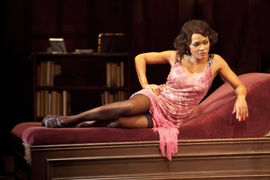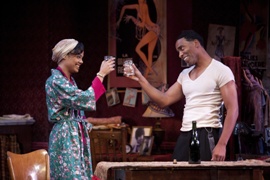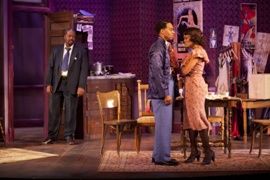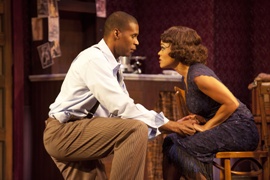
That thrilling period in African American history known as the Harlem Renaissance has only recently been cut short by the onset of the Great Depression when first we meet the fascinating characters created by Pearl Cleage in Blues For An Alabama Sky, the Atlanta-based playwright’s meaty period drama which Sheldon Epps has brought to the Pasadena Playhouse in a richly exciting production under his own inspired direction.
The year is 1930 and gorgeous Harlem nightclub chanteuse Angel Allen (Robin Givins) has just been sacked by Nick, her Italian-American gangster boss/lover, whose recent marriage leaves no more room in his life for the one-time hooker turned entertainer. Had this transpired only a few years earlier, it might not be all that hard for Angel to find a new gig, but the Stock Market has crashed and numerous Harlemites are already living in the streets.
Fortunately for Angel, she still has a place to stay—the apartment she shares with best buddy Guy Jacobs (Kevin T. Carroll), a gay fashion designer whom the Harlem Renaissance has allowed to live openly and proudly a full four decades before Stonewall. Unbeknownst to Angel, however, Guy too has been fired, and he now pins all his dreams on expatriate star Josephine Baker, to whom he has sent a number of designs in hopes that the toast of Paris will offer him a job chez elle.
Next door to the starving artists lives Delia Patterson (Tessa Thompson), an eager young proponent of family planning and a disciple of its chief advocate Margaret Sanger. Delia hopes to convince Pastor Adam Powell of the Abyssinian Baptist Church to open a family planning clinic in Harlem, thereby providing neighborhood women an alternative to becoming pregnant each time they have sex.
Completing Angel’s social circle is Harlem physician Sam Thomas (Kadeem Harison), friends with all three and sweet on Delia.
Blues For An Alabama Sky opens on the fateful summer evening when recent Alabama-to-Harlem transplant Leland Cunningham (Robert Ray Manning, Jr.) enters Angel’s and her friends’ lives, providing a catalyst for romance, jealousy, and murder—though to give further details would spoil the many surprises in Cleage’s nostalgic look at the end of that one brief shining moment when African Americans found a haven in a Manhattan neighborhood called Harlem.
A truly stellar Givens gives a gutsy, bravura performance as Angel, a woman whose theme song ought to be “I Will Survive.” Thompson is earnest perfection as the straight-laced Delia, who finally lets her hair down both literally and figuratively to Sam’s (and Playhouse audience’s) delight. Hardison is absolutely terrific as salt-of-the-earth Sam, whose open-minded embrace of life in all its variations would make him a role model even in 2011. Manning shines as the Alabama fish out of water, whose romantic appeal proves hard for Angel to resist, but whose traditional attitudes prove out of sync with a far more liberal and liberated Harlem. Finally, a splendid Carroll steals every scene he’s in as the ever-so-fabulous Guy, whose out-and-proud embrace of his sexual orientation would seem anachronistic anywhere other than Renaissance Harlem.
Making Cleage’s fascinating tale of a bygone era all the more vivid are the contributions made by the Playhouse’s crackerjack design team, starting off with scenic designer John Iacovelli. A nearly proscenium-size painting of a Harlem Renaissance street scene rises to reveal Iacovelli’s revolving set, which allows both Angel and Guy’s carefully detailed apartment interiors to fill the stage, or for the brownstone’s entryway to move front and center, with steps leading down to the street below, the lights of surrounding buildings shining down from behind. Lighting director extraordinaire Jared A. Sayeg casts a burnished, nostalgic glow on Iacovelli’s set as sound designer Marc Anthony Thompson’s selection of vocals by Harlem’s greatest provides an authentic, mood-setting period soundtrack. Karen Perry’s costumes and wigs are exquisite renditions of the sexy stylish garb of a decade of decadence morphing into one of considerably darker hues.
Casting is by Michael Donovan, CSA. Dee Dee Irwin is associate producer, LoraBeth Barr company manager, Joe Witt production managers, Alex Britton production supervisor, Hethyr Verhoef production stage manager, and Jessica Aguilar assistant manager.
Following a series of big cast, big bucks musicals (including the smash hit Twist: An American Musical), it’s a pleasure to see the Pasadena Playhouse welcoming Blues For An Alabama Sky, an intimate straight play which carries on the tradition of Playhouse gems like Fences, The Little Foxes, Mauritius, and The Night Is A Child. Blues For An Alabama Sky eschews splashy production numbers for the equally thrilling spectacle of human emotions on display. Cleage paints these emotions—love, hate, jealousy, fear, resentment, hope, despair, and rage—with big bright strokes while a simply sensational cast give them humanity and life in this wow of a play and production.
Pasadena Playhouse, 39 South El Molino Ave., Pasadena.
www.pasadenaplayhouse.org
–Steven Stanley
November 8, 2011
Photos: Craig Schwartz






 Since 2007, Steven Stanley's StageSceneLA.com has spotlighted the best in Southern California theater via reviews, interviews, and its annual StageSceneLA Scenies.
Since 2007, Steven Stanley's StageSceneLA.com has spotlighted the best in Southern California theater via reviews, interviews, and its annual StageSceneLA Scenies.







 COPYRIGHT 2024 STEVEN STANLEY :: DESIGN BY
COPYRIGHT 2024 STEVEN STANLEY :: DESIGN BY